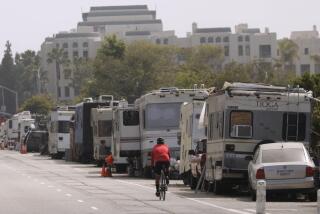Recycling Proceeds Will Benefit Parks, Recreation Centers : Environment: Collection bins have been placed at the sites for newspapers, plastic, glass and other materials.
- Share via
City parks and recreation centers in San Diego are in line to get an economic boost under a recycling program begun last week.
The program will turn over money from recycling to parks and recreation centers where the material is gathered, said Terri Steele, spokeswoman for the city’s Waste Management Department.
Under the agreement, trash bins have been placed at parks in the city for citizens to dump recyclables such as newspapers, plastic, glass, aluminum cans and beverage containers stamped with the redemption value seal.
Forty-one city parks will have recycling bins, said Steele, adding that the bins are painted white and are three cubic yards in size. They also have signs designating newspaper, glass and can compartments.
“This will help us with curbside recycling, which is costly,” Steele said. “Now, all people have to do is drop recyclables off at a nearby park, and the money will benefit that park.”
The bins are designed so that the openings are “scavenger-proof,” and it is almost impossible for someone to be able to extract the recyclables, Steele said.
The idea for the program came from Richard L. Hays, the city’s waste management director, while he was in the Army.
“During the ‘70s at Ft. Bragg, we were encouraged to save the recyclables, and the money from it went to fund the playgrounds,” Hays said.
“The military parents saw that they had the best-looking playgrounds with the best equipment, and this was all due to the recycling program.”
The departments have been planning the program since late last year.
George Loveland, the director of the parks department, said he was surprised by the offer from waste management.
“It was a very welcome surprise from our standpoint,” Loveland said of the possibilities of added income for the parks.
Loveland also said that, if the recycling program is successful, it will continue indefinitely.
“The money gained will be used for equipment and materials, bats and balls, and pay for instructors for other programs,” Loveland said.
Although he refuses to let his hopes get too high, Loveland does not rule out using the money for a variety of other projects such as lighting or construction.
“We don’t anticipate that kind of income, but, if it comes . . . ,” Loveland said.
During the last decade the need for landfill space has been a major issue. Because of the large amount of recyclable materials thrown away each year, many cities have provided curbside service, which is expensive.
The idea of using the space available at the parks alleviates a problem for both city landfill space and waste management, Steele said.
“If we had used curbside recycling we would have had to purchase trucks,” Steele said. “Now, the money goes back to each neighborhood, and people can see it at their parks.”
Steele also said that those who live in apartments or condominiums benefit because curbside recycling is only used in single-home dwellings.
Loveland said most funds for parks come from the city’s general fund.
More to Read
Sign up for Essential California
The most important California stories and recommendations in your inbox every morning.
You may occasionally receive promotional content from the Los Angeles Times.










